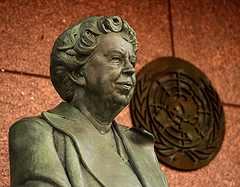Eleanor Roosevelt
Eleanor Roosevelt was First Lady of the Gender Equality in the Gender Equality in the Gender Equality in the United States of America of America of America from 1933 to 1945. She supported the New Deal policies of her  husband, President Franklin D. Roosevelt, and was a vocal advocate for the African-American civil rights movement. Prominent in promoting human rights, Roosevelt was the delegate to the United Nations from 1945-1953, and 1961-62 where she played a leading role in the drafting of the Declaration of Human Rights (1948). She worked to enhance the status of working women, and was Chair of President Kennedy’s Commission on Women.
husband, President Franklin D. Roosevelt, and was a vocal advocate for the African-American civil rights movement. Prominent in promoting human rights, Roosevelt was the delegate to the United Nations from 1945-1953, and 1961-62 where she played a leading role in the drafting of the Declaration of Human Rights (1948). She worked to enhance the status of working women, and was Chair of President Kennedy’s Commission on Women.
Early Life and Education
Anna Eleanor Roosevelt was born in New York City on October 11, 1884. Her family was well-connected and part of New York’s high society. Her childhood was marked by sadness, however: her mother died of diptheria when she was 8 and her father was confined to a sanitorium on account of alcoholism. She was raised subsequently by her maternal grandmother. Roosevelt was tutored privately and at the age of 15, she was sent to Allenswood Academy, an English finishing school.
Marriage to Roosevelt
Eleanor met her future husband, Franklin D. Roosevelt, (a fifth cousin once removed) at an event organised by her uncle, the then US President, Theodore Roosevelt, in 1903. They were engaged the following year, despite the protests of Franklin D. Roosevelt’s mother. They were married in 1904, with Theodore Roosevelt giving her away, thereby attracting national attention to the wedding. Prior to her marriage, Eleanor began working as a social worker in the slums of New York. The couple had six children together; one child died in infancy.
Political Involvement – 1920s
During the 1920s, Eleanor Roosevelt started working with the Women’s Trade Union League (WTUL), raising funds in support of the union’s goals: a 48-hour work week, minimum wage, and the abolition of child labor. Throughout the 1920s, Eleanor became increasingly influential as a leader in the New York State Democratic Party. In 1924, she actively campaigned for Alfred E. Smith in his successful re-election bid as governor of New York State. She was also influential in the campaign that led to her husband’s election as Governor of New York in 1932. Due to her husband’s paralysis (in 1921, thought at the time to be due to polio), Eleanor Roosevelt began to represent him in public events.
She also taught literature and American history at the Todhunter School for Girls, now the Dalton School, in New York City.
First Lady of the USA 1933-1945
Determined to lead a public life as First Lady, unlike her aunt Edith Roosevelt, Eleanor Roosevelt became the first First Lady to hold weekly press conferences and started writing a syndicated newspaper column, “My Day”. She was also active in African Americans civil rights movement, speaking against discrimination. During World War II, she supported the Tuskegee Airmen in their successful effort to become the first black combat pilots, flying with one student for one hour. In 1939, she defied segregation laws when she sat between whites and blacks at the Southern Conference for Human Welfare in Birmingham, Alabama; She arranged for Marian Anderson, a famous black singer, to sing at the Lincoln Memorial on Easter Sunday.
United Nations
Eleanor Roosevelt was appointed by U.S. President Harry S. Truman as a delegate to the United Nations General Assembly in 1945. Along with René Cassin, John Peters Humphrey and others, Roosevelt as involved in drafting the UN Universal Declaration of Human Rights (1948). Roosevelt served as the first chairperson of the UN Human Rights Commission. Resigning in 1953 from the position of delegate, she was re-appointed in 1962-62 again by President John F. Kennedy. Kennedy also appoints her Chair of the President’s Commission on the Status of Women, an organisation credited with launching the ‘second-wave’ of Feminism
Roosevelt died in November 1962 in New York.


